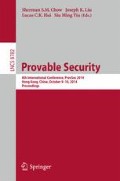Abstract
This paper presents an efficient transformation method that converts fully leakage resilient signature schemes which are weakly existentially unforgeable into ones which are strongly existentially unforgeable. To achieve our goal, we give a definition of leakage resilient chameleon hash function and present a construction based on the leakage resilient hard relation. Then we combine leakage resilient chameleon hash function with the technique presented by Steinfeld, Pieprzyk, and Wang to obtain a generic transformation that works well in the bounded leakage model.
Department of Mathematical and Computing Sciences, Graduate School of Information Science and Engineering, Tokyo Institute of Technology, W8-55, 2-12-1 Ookayama, Meguro-ku, Tokyo 152-8552, Japan. Supported by the Ministry of Education, Science, Sports and Culture, Grant-in-Aid for Scientific Research (A) No.24240001 and (C) No.23500010, a grant of I-System Co. Ltd., and NTT Secure Platform Laboratories.
Access this chapter
Tax calculation will be finalised at checkout
Purchases are for personal use only
Preview
Unable to display preview. Download preview PDF.
References
Akavia, A., Goldwasser, S., Vaikuntanathan, V.: Simultaneous hardcore bits and cryptography against memory attacks. In: Reingold, O. (ed.) TCC 2009. LNCS, vol. 5444, pp. 474–495. Springer, Heidelberg (2009)
Alwen, J., Dodis, Y., Naor, M., Segev, G., Walfish, S., Wichs, D.: Public-key encryption in the bounded-retrieval model. In: Gilbert, H. (ed.) EUROCRYPT 2010. LNCS, vol. 6110, pp. 113–134. Springer, Heidelberg (2010)
Alwen, J., Dodis, Y., Wichs, D.: Leakage-resilient public-key cryptography in the bounded-retrieval model. In: Halevi, S. (ed.) CRYPTO 2009. LNCS, vol. 5677, pp. 36–54. Springer, Heidelberg (2009)
Bellare, M., Goldreich, O., Goldwasser, S.: Incremental cryptography: The case of hashing and signing. In: Desmedt, Y.G. (ed.) CRYPTO 1994. LNCS, vol. 839, pp. 216–233. Springer, Heidelberg (1994)
Bellare, M., Shoup, S.: Two-tier signatures, strongly unforgeable signatures, and fiat-shamir without random oracles. In: Okamoto, T., Wang, X. (eds.) PKC 2007. LNCS, vol. 4450, pp. 201–216. Springer, Heidelberg (2007)
Boneh, D., Shen, E., Waters, B.: Strongly unforgeable signatures based on computational diffie-hellman. In: Yung, M., Dodis, Y., Kiayias, A., Malkin, T. (eds.) PKC 2006. LNCS, vol. 3958, pp. 229–240. Springer, Heidelberg (2006)
Boyle, E., Segev, G., Wichs, D.: Fully leakage-resilient signatures. In: Paterson, K.G. (ed.) EUROCRYPT 2011. LNCS, vol. 6632, pp. 89–108. Springer, Heidelberg (2011)
Brakerski, Z., Goldwasser, S.: Circular and leakage resilient public-key encryption under subgroup indistinguishability. In: Rabin, T. (ed.) CRYPTO 2010. LNCS, vol. 6223, pp. 1–20. Springer, Heidelberg (2010)
Brands, S.A.: An efficient off-line electronic cash system based on the representation problem. Technical report, Amsterdam, The Netherlands (1993)
Dodis, Y., Haralambiev, K., López-Alt, A., Wichs, D.: Efficient public-key cryptography in the presence of key leakage. In: Abe, M. (ed.) ASIACRYPT 2010. LNCS, vol. 6477, pp. 613–631. Springer, Heidelberg (2010)
Dodis, Y., Ostrovsky, R., Reyzin, L., Smith, A.: Fuzzy extractors: How to generate strong keys from biometrics and other noisy data. SIAM J. Comput. 38(1), 97–139 (2008)
Garg, S., Jain, A., Sahai, A.: Leakage-resilient zero knowledge. In: Rogaway, P. (ed.) CRYPTO 2011. LNCS, vol. 6841, pp. 297–315. Springer, Heidelberg (2011)
Huang, Q., Wong, D.S., Zhao, Y.: Generic transformation to strongly unforgeable signatures. In: Katz, J., Yung, M. (eds.) ACNS 2007. LNCS, vol. 4521, pp. 1–17. Springer, Heidelberg (2007)
Katz, J., Vaikuntanathan, V.: Signature schemes with bounded leakage resilience. In: Matsui, M. (ed.) ASIACRYPT 2009. LNCS, vol. 5912, pp. 703–720. Springer, Heidelberg (2009)
Krawczyk, H., Rabin, T.: Chameleon signatures. In: NDSS. The Internet Society (2000)
Lyubashevsky, V., Palacio, A., Segev, G.: Public-key cryptographic primitives provably as secure as subset sum. In: Micciancio, D. (ed.) TCC 2010. LNCS, vol. 5978, pp. 382–400. Springer, Heidelberg (2010)
Naor, M., Segev, G.: Public-key cryptosystems resilient to key leakage. In: Halevi, S. (ed.) CRYPTO 2009. LNCS, vol. 5677, pp. 18–35. Springer, Heidelberg (2009)
Okamoto, T.: Provably secure and practical identification schemes and corresponding signature schemes. In: Brickell, E.F. (ed.) CRYPTO 1992. LNCS, vol. 740, pp. 31–53. Springer, Heidelberg (1993)
Shamir, A., Tauman, Y.: Improved online/offline signature schemes. In: Kilian, J. (ed.) CRYPTO 2001. LNCS, vol. 2139, pp. 355–367. Springer, Heidelberg (2001)
Steinfeld, R., Pieprzyk, J., Wang, H.: How to strengthen any weakly unforgeable signature into a strongly unforgeable signature. In: Abe, M. (ed.) CT-RSA 2007. LNCS, vol. 4377, pp. 357–371. Springer, Heidelberg (2006)
Teranishi, I., Oyama, T., Ogata, W.: General conversion for obtaining strongly existentially unforgeable signatures. In: Barua, R., Lange, T. (eds.) INDOCRYPT 2006. LNCS, vol. 4329, pp. 191–205. Springer, Heidelberg (2006)
Wang, Y., Tanaka, K.: Strongly simulation-extractable leakage-resilient NIZK. In: Susilo, W., Mu, Y. (eds.) ACISP 2014. LNCS, vol. 8544, pp. 66–81. Springer, Heidelberg (2014)
Author information
Authors and Affiliations
Editor information
Editors and Affiliations
Rights and permissions
Copyright information
© 2014 Springer International Publishing Switzerland
About this paper
Cite this paper
Wang, Y., Tanaka, K. (2014). Generic Transformation to Strongly Existentially Unforgeable Signature Schemes with Leakage Resiliency. In: Chow, S.S.M., Liu, J.K., Hui, L.C.K., Yiu, S.M. (eds) Provable Security. ProvSec 2014. Lecture Notes in Computer Science, vol 8782. Springer, Cham. https://doi.org/10.1007/978-3-319-12475-9_9
Download citation
DOI: https://doi.org/10.1007/978-3-319-12475-9_9
Publisher Name: Springer, Cham
Print ISBN: 978-3-319-12474-2
Online ISBN: 978-3-319-12475-9
eBook Packages: Computer ScienceComputer Science (R0)

